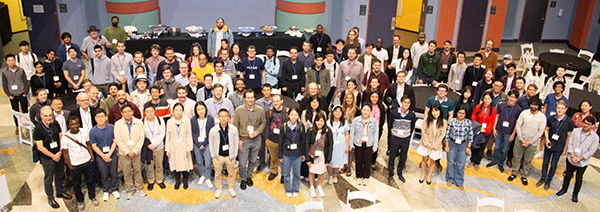SSP Moderator Frederi Viens rites:
Some 150 scholars in mathematics, statistics, and related disciplines, in great majority doctoral students and postdocs from across the US, came to Rice University in Houston, Texas, to attend the annual Seminar on Stochastic Processes (SSP), a conference series sponsored by the Institute of Mathematical Sciences (IMS).
“This was a pretty hardcore crowd. They came to hear about cutting-edge research in stochastic processes and other aspects of probability theory and its applications,” said Frederi Viens, Professor of Statistics at Rice, one of the event’s organizers, who has been the conference series’ moderator since 2017.
Held annually since 1981 and rotating among various universities, the seminar took place March 13-16 in Duncan Hall on the Rice campus. Historically envisioned by its founders as a North American analogue of the venerable Séminaire des probabilités, which started in Strasbourg, France, in the 1960s, SSP soon became the premier conference on stochastic processes in North America.
“The seminar is really about the students and early-career researchers. Some are interested in finance or business, or genetics and evolution, or health and medicine, many are just looking to learn more about the theory of stochastic processes, and it gives them an opportunity to network and make connections,” said Guodong Pang, Professor of Computational Applied Mathematics and Operations Research at Rice, and another of SSP’s organizers.
Featured were some 35 lightning talks devoted to research by students, postdocs, and early-career researchers from across the USA and locations as far as Australia, Thailand, and Hong Kong, coupled with 40 poster presentations. All conference sessions, including the main talks, the lightning talks, and the poster sessions, are plenary, giving SSP a strong cultural identity where all participants feel included.
As part of a long-standing tradition at SSP, this year’s conference featured two sessions where participants are free to go up to the blackboard and present open problems for discussion among all participants. This year, SSP continued a new tradition, started in 2017, of a career panel session for early-career researchers, where a diverse group of five successful academics working in various aspects of stochastic processes fielded questions from the participants about how to set oneself up for academic success in the field. The panelists included Rice Stat department’s own Profs. Kathy Ensor (Rice), Phanuel Mariano (Union College), Robert Neel (Lehigh University), Patricia Ning (Texas A&M University), and Alejandra Quintos (University of Wisconsin). Ensor was one of the local members of the SSP 2024 scientific committee, along with Rice Stat Professor Marek Kimmel, University of Houston Math Professor Robert Azencott, plus Pang and Viens.
Each conference features five invited speakers along with tutorial lectures. The speakers at this year’s SSP were: Tom Hutchcroft (Cal Tech); Étienne Pardoux (Aix-Marseille University, France); Sébastien Roch (University of Wisconsin, Madison); Perla Sousi (University of Cambridge); Ludovic Tangpi (Princeton University); and Yilin Wang (Institut des Hautes Études Scientifiques, Bures-sur-Yvette, France).
The organizers of this year’s SSP received many unsolicited positive elements of feedback from participants and from members of the scientific committee during and after the event. Prof. Steve Evans from U.C. Berkeley noted: “The lecture hall was packed with enthusiastic, mainly young, attendees and I thought the talks were all of a uniformly high standard.” A sentiment echoed during the conference by a number of early-career researchers was summarized later in an e-mail by Dr. Linh N. Huynh from Dartmouth College: “It was a wonderful experience and I greatly appreciate the opportunity to meet and discuss math with the Stochastic Processes/Probability community.”
While one can always aspire to improving on how conferences are managed, many participants shared with Pang and Viens that they thought this was a well-organized SSP. And while the focus of the conference was entirely on making sure that all students and early-career researchers got ample opportunities to network with each other and with the six extraordinary scholars who were the main speakers, some participants benefited from a true Texas cultural experience, by attending events at the annual Houston Livestock Show and Rodeo, the biggest of its kind in the US.
By all accounts, SSP 2024 at Rice University was successful. “I look forward to the next edition of SSP, which will be held at Indiana University in Bloomington from March 19 to 22, 2025,” said Viens, the SSP Moderator.

Attendees at the 2024 SSP meeting